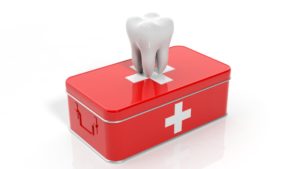No one ever wants to experience an emergency, especially one concerning our teeth. In fact, dental emergencies are not generally high on everyone’s list of priorities. However, it is best to be prepared in the event of an actual emergency. Knowing what to do can be the difference between keeping your tooth and losing it. In addition, you can help minimize any long-term damage with knowledge and action.

Knocked-Out Tooth
For many reasons, having a tooth get knocked out of your mouth can be scary. A missing tooth can damage your self-esteem and the efficiency of your teeth. If you have a tooth that falls out due to dental trauma, your dentist will be able to replace it as long as you are prepared.
There is a narrow window of time to get your tooth back in place. From the time of the initial injury, you have about an hour to get to an emergency dentist.
After finding your tooth, be sure to only pick it up by the crown—the white part. The delicate nerves make up the other end of the tooth, which you can easily damage. Damaging the nerves can make it difficult for your dentist to reattach your tooth.
As you make your way to the dentist, you need to carry your tooth carefully. To do this, you can try to place your tooth back in its socket. It is vital not to force the tooth into its socket; otherwise, you can damage the nerves. If the tooth doesn’t fit, you can either keep the tooth in your mouth between your cheek and gums or place the tooth in milk.
Soft Tissue Injury
A soft tissue injury is when you receive a cut, scrape, or puncture wound to your gums, tongue, cheeks, or lips. There are numerous ways you can sustain these injuries, from a fall to a dog bite. Many soft tissue injuries need stitches to help with the healing process. Additionally, your dentist will likely prescribe antibiotics to avoid infection.
If you are bleeding, place a clean, dry cloth over the wound and keep pressure. This will help slow or stop the bleeding as you make your way to the dentist.
Toothache
Generally, feeling pain in your teeth is not normal. While the pain may have a simple answer, you should always consult your dentist if you feel pain. You may not realize it, but some tooth pain is an emergency.
If you have sharp, unmanageable pain, you should call your dentist. Having severe pain that lingers could be a sign of infection. Without treatment, infections can spread to other places in your mouth and body. Additionally, infections can be deadly, meaning you need to seek treatment.
Other signs of an infection include swollen gums or jaw, a pimple or boil on your gums, or a sour taste in your mouth.

